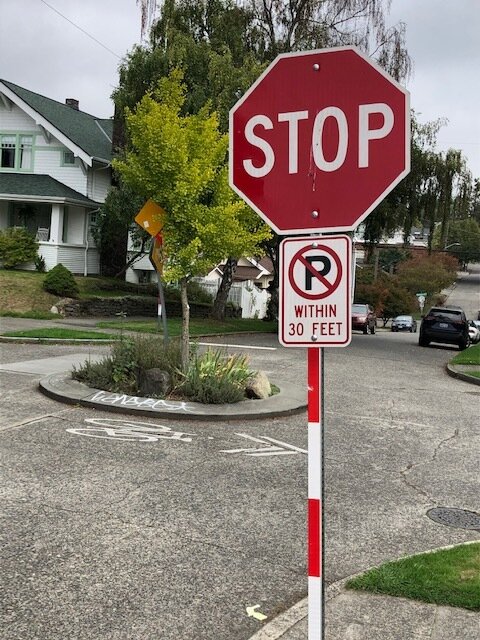
In 1982, Idaho made it legal for a person riding a bicycle to treat a stop sign as a yield sign. This is not a license to “blow through” stop signs; it is not, as the Beastie Boys might say, a “License to Ill”. But it’s also not stupid.
Rights of way do not change. The duty to ride safely does not change. Before a stop sign, a bicyclist must slow down, stop if required for safety, and yield to any approaching vehicle or pedestrian. The law does not apply to an intersection controlled by a traffic light.
Washington joins a growing number of states in this change. Our new statute, RCW 46.61.190(2)(b), allows a person operating a bicycle approaching a stop sign to either stop or yield. Yet, bicyclists must still stop as required at a highway grade crossing of a railroad or for a school bus.
Arguments for the law include:
- Allowing bicyclists to conserve momentum, which helps them to avoid motor vehicles by encouraging separation. Motorists are much quicker to start after stopping, and/or may not see cyclists in traffic. Bicyclists can be unsteady and even veer dangerously when starting to ride, especially when nervous, which increases collision risk
- It’s safer, according to some studies. One study showed a 14 percent drop in bicycle injuries after Idaho passed its law. Another showed a 30 to 60 percent increase in safety.
- Encouraging bicyclists to use low speed routes with more stop signs.
- As “vulnerable users of a public way,” RCW 46.61.526(11)(c)(iii)(B), bicyclists must be treated differently than cars for some purposes in the interests of safety, traffic management, other public policies. (See my blog post of April 20, 2019.)
- Most bicyclists already have “built in” terror about crossing intersections.
- Allowing cyclists to time their entry into an intersection in order to take advantage of a car to the left already in it, which can block the cyclist from at least some possible cross traffic.
- Respect for laws increases when laws reflect actual, generally safe behavior. (One study shows over half of the cyclists in Seattle already do not stop fully at stop signs. A Chicago study found 1 in 25 obey the stop sign.)
- Ending ticketing of bicyclists who are fundamentally behaving safely.
Arguments against such a law include:
- The law will encourage scofflaws to “blow through” stop signs.
- The law will be confusing for motorists, who should be able to expect bicyclists not to intrude upon another’s right of way.
- Cyclists tend to look for cars in the intersection, not so much pedestrians entering crosswalks, so this rule increases danger for pedestrians.
- Four-way intersections may become even more confusing to navigate.
- If “California” rolling stops are illegal for cars, “Idaho stops” should be illegal for bikes – as a matter of fairness.
Paul Stritmatter observes that this law will affect questions of fact at trial, whether the bicyclist sustained injury or inflicted it. Well, that’s true. We will need to hear more at trial about the facts, we may need to employ experts in human factors and accident reconstruction more than we do now in such cases, and juries will need to focus more on who was acting safely and who wasn’t; which is, in this circumstance at least, not necessarily the same as determining who conformed to rules made to benefit cars and who did not. Even so, the meanings of “stop” and “yield”, and the duty to yield “if required for safety”, remain unchanged.
